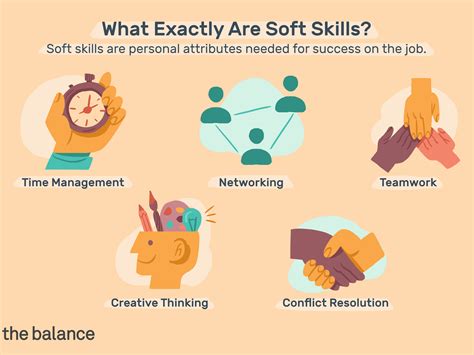Understanding Soft Skills: What Are They?

Soft skills, also known as interpersonal skills or people skills, are the personal attributes and competencies that enable individuals to effectively communicate, collaborate, and interact with others in a professional setting. Unlike hard skills, which are technical or job-specific abilities, soft skills are transferable and applicable across various industries and job roles.
Why Are Soft Skills Important?
Soft skills are essential for success in the workplace as they not only enhance productivity and job performance but also contribute to personal and professional growth. In fact, according to a survey by LinkedIn, 92% of talent professionals and hiring managers believe that soft skills are equally or more important than hard skills when evaluating candidates for a job.
Examples of Soft Skills
Some of the most common soft skills include:
- Communication: the ability to convey information clearly and effectively
- Teamwork: the ability to collaborate with others towards a common goal
- Leadership: the ability to inspire and guide others towards success
- Problem-solving: the ability to identify and resolve issues using critical thinking and creativity
- Adaptability: the ability to be flexible and adjust to changes in the workplace
- Time management: the ability to prioritize tasks and meet deadlines
- Emotional intelligence: the ability to understand and manage one’s own emotions as well as others’
- Conflict resolution: the ability to handle and resolve disagreements effectively
- Networking: the ability to build and maintain professional relationships
- Customer service: the ability to provide excellent service and support to customers
Developing Soft Skills
While some people may naturally possess certain soft skills, others may need to develop them through training and practice. Some ways to improve your soft skills include:
- Seek feedback: ask for feedback from colleagues or managers on areas where you can improve
- Take courses: attend training programs or workshops that focus on soft skills development
- Volunteer: participate in volunteer work or community service to enhance teamwork and leadership skills
- Practice: practice active listening, conflict resolution, and other soft skills in your daily interactions
- Observe others: learn from others who demonstrate strong soft skills and try to emulate their behavior
Conclusion
Soft skills are critical for success in any workplace, and their importance cannot be overstated. Developing and honing these skills can help individuals not only excel in their current roles but also advance in their careers. By recognizing the value of soft skills and committing to their ongoing development, individuals can position themselves for long-term success.
FAQs
What are some examples of soft skills?
Examples of soft skills include communication, teamwork, leadership, problem-solving, adaptability, time management, emotional intelligence, conflict resolution, networking, and customer service.
Why are soft skills important?
Soft skills are important because they enable individuals to effectively communicate, collaborate, and interact with others in a professional setting. They enhance productivity and job performance and contribute to personal and professional growth.
How can I develop my soft skills?
Some ways to develop soft skills include seeking feedback, taking courses, participating in volunteer work or community service, practicing active listening and conflict resolution, and learning from others who demonstrate strong soft skills.
